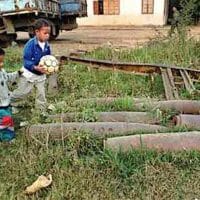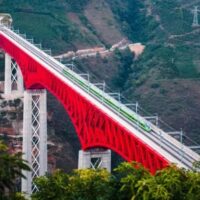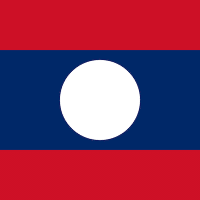-
Why the world’s most bombed country may still suffer from these wounds after a hundred years
Laos is a country in Southeast Asia with a rich development potential based on vast water resources as well as minerals including gold.
-
ASEAN nations using Laos-China Railway for ‘green’, low-carbon freight
In early December 2021, Laos inaugurated the Boten-Vientiane railway, a 414-kilometer (km) electrified high-speed railway that runs between the capital Vientiane and the town of Boten on the Laos-China border.
-
Laos has tackled COVID-19, but it is drowning in debt to international finance
On June 11, Laos (Lao People’s Democratic Republic)—a country of 7 million in Southeast Asia—said it had temporarily prevailed over COVID-19.
-
A History of a Counter-Revolution
Gerald Horne. The Counter-Revolution of 1776: Slave Resistance and the Origins of the United States of America. NYU Press, 2014. In the conventional, celebratory liberal historical narrative about the Founding Fathers, the post-revolutionary persistence of slavery in the United States, along with women’s lack of essential political and legal rights, has long been regarded as […]
-
The “Brown International” of the European Far Right
In the lead-up to the international day of action against fascism on 22 March, Thanasis Kampagiannis, writing in the latest issue of Σοσιαλισμός από Κάτω (Socialism From Below), the theoretical journal of the Greek Socialist Workers Party (SEK), looks at the danger of a major far Right breakthrough in May’s European Parliament elections and […]
-
Interview with Hong Kong Dockworkers Leader
The battle of the Hong Kong dockers, as Union of Hong Kong Dock Workers (UHKDW) Secretary Wong Yu Loy reveals, was important not only because of the rarity of strikes in Hong Kong, or because it was a pitched battle with Hong Kong’s wealthiest corporate magnate, but also because of the way corporate globalization set […]
-
Golden Dawn: The Development of Greek Fascism
As was the case in 1930s Germany, Greek liberalism has revealed itself to be politically spent. In dealing with the austerity measures imposed upon the country from outside by an international troika consisting of the IMF, European Commission, and European Central Bank, the government has failed comprehensively in the eyes of its electorate. When the […]
-
Greece at a Crossroads: Crisis and Radicalization in the Southern European Semi-periphery
Introduction The Greek crisis represents the deepening of a long systemic contradiction whose origins lie in the 1960s, in the stagnation of monopoly capitalism and the emergence of the South. The industrial centers of the world economy were struck by a crisis of profitability, which was displaced outward in space and forward in time by […]
-
The Class Dynamics of Asian America: A Primer
The notion that Asian Americans are model minorities originated in the 1960s, mainly in reference to the socioeconomic gains of Japanese and Chinese Americans in particular. It did not take long, however, for that very idea to be applied to Asian Americans as a whole, especially as it continues to be perpetuated by the mainstream […]
-
Interview with John Tully, Author of The Devil’s Milk: A Social History of Rubber
Why, of all possible commodities, did you choose to write a book on rubber? The Devil’s Milk: A Social History of Rubber” width=”260″ height=”393″ border=”0″ title=”BUY THIS BOOK”>THE DEVIL’S MILK: A Social History of Rubberby John Tully BUY THIS BOOK The Devil’s Milk: A Social History of Rubber Book Launch with author John Tully Tuesday, […]
-
Adam Jones on Rwanda and Genocide: A Reply
Like Gerald Caplan’s hostile “review” of our book, The Politics of Genocide, Adam Jones’s aggressive attack on our response to Caplan can be explained in significant part by Jones’s deep commitment to an establishment narrative on the Rwandan genocide that we believe to be false — one that misallocates the main responsibility for that still […]
-
Confront Dow Chemical at the Dow/Live Earth Run for Water
CALL TO ACTION Organize Events in Your City! Confront Dow Chemical at the Dow/Live Earth Run for Water Tell Dow: You Can’t Run from Your Responsibilities! APRIL 18 2010, 8:00 am Dow Chemical was among the chief producers and profiteers of Agent Orange during the Vietnam War. In addition to wartime exposure resulting in […]
-
American Police Training and Political Violence: From the Philippines Conquest to the Killing Fields of Afghanistan and Iraq
“In the police you see the dirty work of Empire at close quarters. The wretched prisoners huddling in stinking cages of the lock-ups, the grey cowed faces of the long-term convicts, the scarred buttocks of the men who had been flogged with bamboos.” –George Orwell, Shooting An Elephant and Other Essays “. . . the […]
-
March 6, 1970/2010 . . . A Day to Remember
A front page headline in the New York Times on March 7, 1970 announced: “Townhouse Razed by Blast and Fire; Man’s Body Found.” The story described an elegant four-story brick building in Greenwich Village destroyed by three large explosions and a raging fire “probably caused by leaking gas” at about noon on Friday, March 6. […]
-
The Oliver Kamm School of Falsification: Imperial Truth-Enforcement, British Branch
An important and perhaps growing feature of official and strong-interest-group propaganda is the resort to personal attacks and flak to keep dissidents at bay and inconvenient thoughts out of sight and mind. This has been notable over many years in the case of pro-Israel propaganda, where we can observe a positive correlation between upward spikes […]
-
Bringing Empire Home
Alfred W. McCoy. Policing America’s Empire: The United States, the Philippines and the Rise of the Surveillance State. Madison, WI: The University of Wisconsin Press, 2009. In the build-up to the Iraq and Afghan wars, liberal humanitarians and neoconservatives alike bantered on and on about the necessity of empire and its capability of removing tyrannical […]
-
Responsibility to Protect?
On July 23, a debate concerning the Responsibility to Protect took place in front of the General Assembly of the United Nations. The responsibility to protect (R2P) is a notion agreed to by world leaders in 2005 that holds States responsible for shielding their own populations from genocide, war crimes, ethnic cleansing, and related crimes […]
-
Asia: Land Grabs Threaten Food Security
See, also, Food Crisis and the Global Land Grab at , a new Web site set up by Grain. PHNOM PENH, 10 June 2009 (IRIN) — Sam Pov, a rice farmer in Cambodia’s western Battambang Province, is very worried that his land will be taken over by a foreign investor. “I’ve heard the rumours about […]
-
UNESCAP: Food Prices Will Rise Again
JOHANNESBURG, 26 May 2009 (IRIN) — Food prices will rise again by 2015, when economies are expected to have recovered from the global recession, pushing up demand once more, says a recent UN report. 2008 is seen as the year of food crises, prompted in part by high fuel prices, but these started declining as […]
-
Seized! The 2008 Land Grab for Food and Financial Security
Today’s food and financial crises have, in tandem, triggered a new global land grab. On the one hand, “food insecure” governments that rely on imports to feed their people are snatching up vast areas of farmland abroad for their own offshore food production. On the other hand, food corporations and private investors, hungry for profits […]



